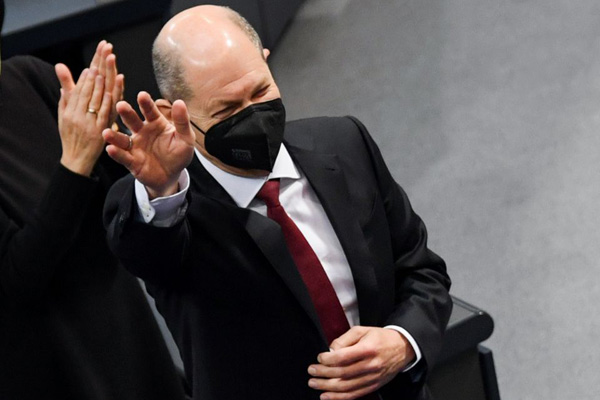 |
| Designated German Chancellor Olaf Scholz reacts after being elected as new chancellor during a session of the German lower house of parliament Bundestag, in Berlin, Germany, December 8, 2021. REUTERS/Annegret Hilse |
BERLIN, Dec 8 (Reuters) - German lawmakers elected Social Democrat Olaf Scholz as new chancellor on Wednesday, ending 16 years of conservative rule under Angela Merkel and paving the way for a pro-European coalition government which has vowed to boost green investment.
Scholz, 63, who served as vice chancellor and finance minister in Merkel's outgoing government, got a clear majority of 395 votes from lawmakers in the Bundestag lower house of parliament, Bundestag President Baerbel Bas said.
Scholz, who nodded wearing a face mask and waved as he received a standing ovation from lawmakers, received bouquets of flowers and a basket of apples from the leaders of the parliamentary groups.
After being nominated by President Frank-Walter Steinmeier in near-by Bellevue Castle, Scholz will return to parliament to take the oath of office in front of the lawmakers.
In the afternoon, Merkel will hand over the chancellery to the new leader of Europe's largest economy which is facing a brutal fourth wave of coronavirus infections and challenges to its democratic order by authoritarian regimes.
With his down-to-earth and no-nonsense manner, Scholz has positioned himself as Merkel's natural successor and a safe pair of hands to steer Germany through challenges ranging from tackling the climate crisis to dealing with a more confrontational Russia and a more assertive China.
Scholz will lead an unprecedented three-way ruling coalition on the federal level with the pro-spending, environmentalist Greens and the fiscally more conservative, libertarian Free Democrats (FDP) - unlikely political bedfellows in the past.
Scholz is an experienced negotiator and veteran politician who as SPD party secretary general from 2002 until 2004 defended controversial labour market reforms and social welfare cuts under former Chancellor Gerhard Schroeder.
As labour minister from 2007-2009 in Merkel's first ruling coalition, Scholz pushed for a generous short-time work scheme, also known as Kurzarbeit, which helped to protect millions of workers from the outfall of the global financial crisis.
After being major of the northern port city of Hamburg from 2011-2018, Scholz returned to Berlin as Merkel's finance minister - a role in which he got rid of the goal of balanced budgets and enable record new borrowing to shield companies and employees from the impact of the coronavirus pandemic.
On the European level, he worked closely together with France and convinced Merkel to support a debt-financed European Recovery Fund worth 800 billion euros to help EU member states hit the most by COVID.
Leave Comments